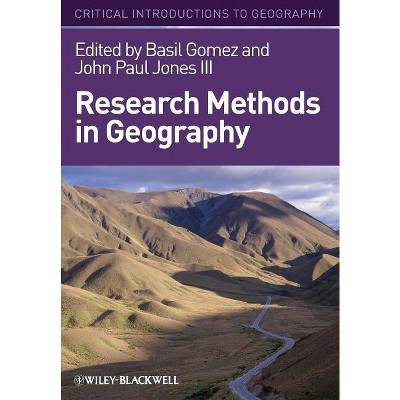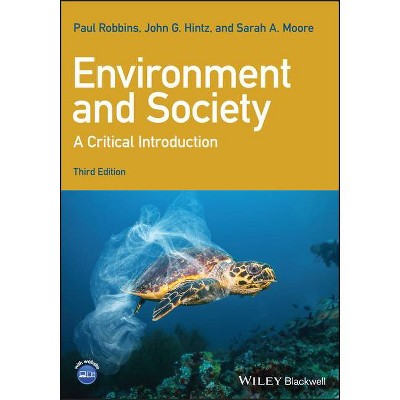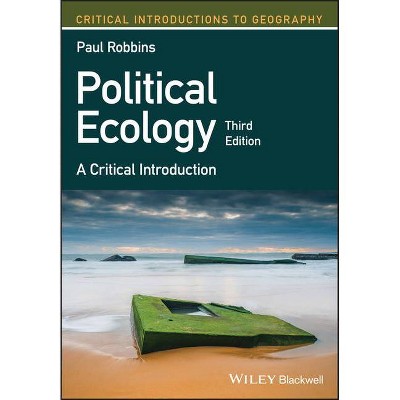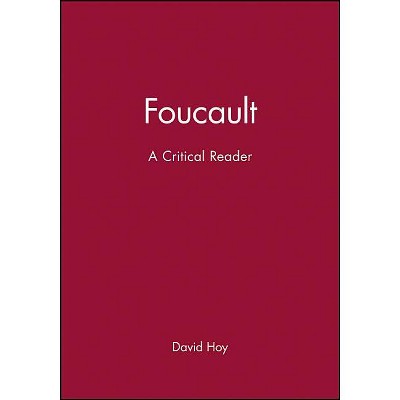Water - (Critical Introductions to Geography) by Katie Meehan & Naho Mirumachi & Alex Loftus & Majed Akhter (Paperback)

About this item
Highlights
- Discover the hydrosocial cycle and the impact of power, knowledge, and scarcity on water rights and use through this engaging and student-friendly textbook In Water: A Critical Introduction, a team of distinguished researchers delivers an expert examination of our most pressing water-related challenges, arguing that flows of water are shaped by social practices and geometries of power.
- About the Author: Katie Meehan is Reader in Environment and Society at King's College London, where she is Co-Director of King's Water Centre.
- 304 Pages
- Science, Environmental Science
- Series Name: Critical Introductions to Geography
Description
About the Book
"This book is the product of four people with very different backgrounds, interests, and life experiences. What unites us is a curiosity about the world, a relentless drive to question, and a responsibility to the people, places, and waters we have met along the way"--Book Synopsis
Discover the hydrosocial cycle and the impact of power, knowledge, and scarcity on water rights and use through this engaging and student-friendly textbook
In Water: A Critical Introduction, a team of distinguished researchers delivers an expert examination of our most pressing water-related challenges, arguing that flows of water are shaped by social practices and geometries of power. Combining first-hand research and headline case studies, the authors reveal the hydrosocial relations often hidden in mainstream accounts of water, delving into current issues like water scarcity, floods, global water governance, legal conflicts, human rights, potable water provision, health, the water-food-energy nexus, and much more.
Spanning five centuries, this comprehensive volume reflects on how imperial expansion has shaped hydrosocial relations in and between Europe, Asia, Africa, and the Americas, how water demand has changed over time, and how this change impacted lifestyle.
As the first major text to synthesize critical water research in both local and global perspectives, this book is anchored by clear and compelling arguments -- the "four planks" -- and supported by the authors' original research and up-to-date synthesis of the latest critical research on major water problems. It also includes maps, illustrations, and additional learning materials to be used by educators. Readers will find:
- A lively and thorough introduction that explains why a critical approach is necessary to fully understand our current water challenges, with a focus on the "skeptical superhero"
- A global approach to key debates in water issues, including large dams, privatization, transboundary conflicts, agriculture and irrigation, water and sanitation provision, human rights, governance dilemmas, and the Sustainable Development Goals
- Comprehensive explorations of the roles played by expert knowledge, global capital, climate change, and justice struggles in the hydrosocial cycle
- Critical theoretical perspectives that integrate environmental social sciences, feminist critique, and a broadly defined political economy with the specificities of water resources
- Fulsome treatments of water governance, science, and management, including the origins and implications of neoliberal approaches to the privatization, commodification, and financialization of water
- An accessible text that "invites the reader" on a critical journey
Water: A Critical Introduction is a key text for advanced high school, undergraduate, and graduate students who want a keener understanding of trends in environmental management, political ecology, and water governance, science, and engineering. Written with an interdisciplinary audience in mind, this book will benefit students taking courses in environmental studies, environmental law, geopolitics, international studies, human geography, hydrology, engineering, environmental economics, and related disciplines.
From the Back Cover
"Water: A Critical Introduction is informed by contemporary critical theory. There is a touch of science studies here, feminist critique, and a broadly defined political economy. This is commendable, cutting-edge, and fills a real need."
Professor Paul Robbins, Nelson Institute for Environmental Studies, University of Wisconsin-Madison"
"I only realized how much I needed this book when reading it! Written by my favorite water scholars, it provides an extremely useful and well-written primer to critical water studies."
Professor Margreet Zwarteveen, UNESCO-IHE Delft Institute for Water Education
"This book is an amazing piece of work. The stories shared provide timely insights for reimagining values, ethics, water security and water justice. Our rivers must be loved, respected, and valued in order to protect humanity, and Mother Earth."
Professor Anne Poelina, Nulungu Research Institute, University of Notre Dame Australia
Water shapes--and is shaped by--social practices and power relations. This simple yet provocative claim is at the center of Water: A Critical Introduction, which synthesizes critical water research and presents compelling case studies of hydrosocial relations from around the globe. Challenging the conventional approach to water science, the authors combine original research with the work of leading scholars worldwide and integrate environmental social sciences, feminist critique, and political economy with the specificities of water resources.
As the first work to draw together the body of knowledge in critical water studies, this book is a landmark resource that will open readers' eyes to the indelible links between human society and the hydrosphere. And it does so in a lively, engaging tone that--the authors promise--is never boring.
Lavishly enriched with maps, illustrations, and learning materials, this text communicates four compelling arguments that are deeply important for today's students to consider: knowledge is power, scarcity is made, water is life, and camp (praxis) is everywhere. For learners in secondary, undergraduate, and graduate courses in environmental studies, water governance, science and engineering, geopolitics, environmental law and management, political ecology, and related disciplines, Water: A Critical Introduction is a refreshing step out of the mainstream and into a nuanced look at water in the world today.
About the Author
Katie Meehan is Reader in Environment and Society at King's College London, where she is Co-Director of King's Water Centre. She is an Editor (Nature and Society) of the Annals of the American Association of Geographers and has authored over three dozen publications on the politics of water infrastructure, development, and household water insecurity.
Naho Mirumachi is Professor of Environmental Politics at the Department of Geography at King's College London and Co-Director of King's Water Centre. Her research focuses on the governance of water resources and climate security, including water diplomacy, water-climate security, water resilience and socio-political barriers to water sustainability. She has written reports for UN Environment, European Parliament and contributed to the IPCC Sixth Assessment Report.
Alex Loftus is Professor of Political Ecology at King's College London. His research is focused on the political ecology of water and the environment, with a particular interest in the right to water and emerging processes of financialization. He co-edited Water Politics: Governance, Justice, and the Right to Water (2020, with F. Sultana) and is author of Everyday Environmentalism (2012).
Majed Akhter is Senior Lecturer in Environment and Society at King's College London. His research interests sit at the intersection of geopolitics, environment, and natural resources, with a focus on decolonization in South and Southeast Asia. He was named a BBC/AHRC New Generation Thinker in 2019.











